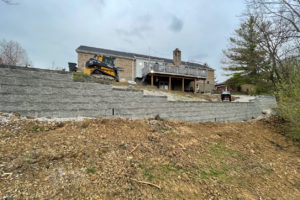
Materials Used For Retaining Walls
Retaining walls have a sculptural quality that adds definition to the landscape. They can be made from various materials to bring forth different styles. Stacked timbers or mortared stone can impact a rustic look, while poured concrete has a modern look. The main thing to remember about a retaining wall is that it is meant to hold back tons of soil so there is little room for error in the construction.
What Wood Should I Use For A Retaining Wall?
The best kind of lumber for these walls is fir or pine pressure treated with preservatives to discourage rot. It will be green or brown in color and rated for earth-to-wood contact. These walls need a basic crushed stone footing and T-shaped timber to anchor them. They could survive 40 years. The average cost of basic pressure treated pine runs about $15-$25 per square foot. Fancier woods will cost a bit more, usually between $25-$30 per square foot.
Stone, Brick, Or Concrete Block Retaining Wall
All are strong and long lasting and the materials can be bought at a stone yard or home center. But with this type of material, you will need a mason to install the wall.
- Modern concrete block walls are fairly sophisticated systems designed for strength as well as fast and easy assembly. You simply stack the blocks on top of one another and secure them with pins, clips or interlocking edges.
- A rubble wall is made of random sizes and shapes of stone fitted tightly together when stacked. Blends of various colors and/or types of stone make these walls attractive and unique. While it’s creative, building this type of wall is time consuming. It takes a while to find the stone that fits just right.
- Brick retaining walls can serve aesthetic and landscape design functions as well. A retaining wall installation will most certainly enhance the value of your home and property, as well.
They will need only crushed stone footing. The national average materials cost to install a stone wall is $12.58 per square foot, with a range between $10.03 to $15.13. The total price for labor and materials per square foot is $28.03, coming in between $23.90 to $32.16. Stone and concrete retaining walls last between 50 and 100 years. Brick retaining walls last at least 100 years.
Poured Concrete Retaining Wall
Concrete is the strongest and most durable choice. It can be stamped, stained, veneered, or curved to look like mortared stone. However, you will want to leave the design, formwork, and pouring to professionals. Concrete walls are supported by reinforced concrete footing. Usually, the cost of construction varies from place to place. But as a matter of fact, poured walls cost about 20% less than the masonry walls. Poured concrete retaining walls will last 50 to 100 years.
Mortarless Interlocking Concrete Block Retaining Wall
An easy choice because of their lightweight, flat sides and the foolproof way they fit together without mortar. They have a quarried look and come in a variety of gray, tan, and red hues. They rest on crushed stone footing. The cost for interlocking concrete blocks is between $20 to $30 per square foot.
We Provide Retaining Wall Planning and Design
When you decide to add a retaining wall to your property, you’re embarking on a project that combines functionality with aesthetic appeal. You’ll work closely with us to determine the ideal location, height, and materials for your wall. Whether you’re looking to prevent soil erosion, create level areas on a sloped yard, or simply add a striking visual element to your landscape, the planning phase is crucial. You’ll consider factors such as drainage, soil type, and local building codes to ensure your retaining wall is both effective and compliant.
> Learn More
Contact us (859-640-0657) for a free consultation!
—

About Presentable Landscaping
Presentable Landscaping provides many landscaping services to our customers in Northern Kentucky and Greater Cincinnati.